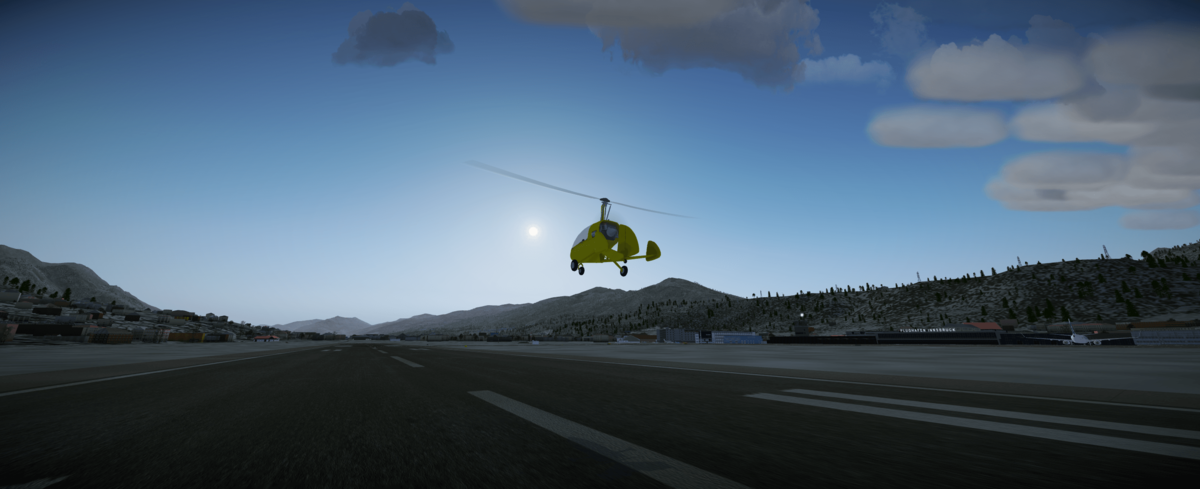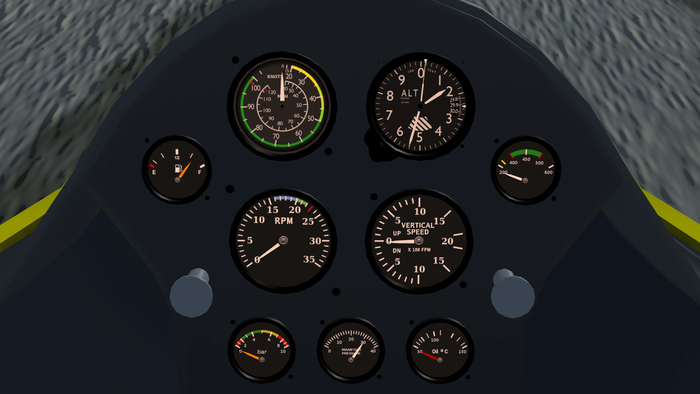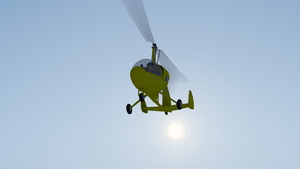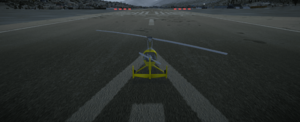JT-5B
Jump to navigation
Jump to search
 | |
|---|---|
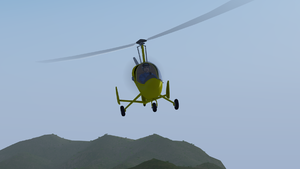 | |
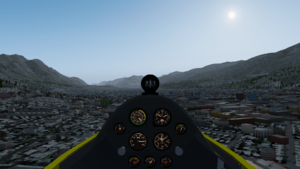 | |
| Type | Autogyro |
| Configuration | Fixed gear aircraft, Tricycle landing gear aircraft |
| Propulsion | Single engine aircraft, Pusher aircraft |
| Manufacturer | Jukka Tervamäki |
| Author(s) | Edin Hozic (mr no) |
| FDM | YASim |
| --aircraft= | JT-5B |
| Status | Production |
| FDM |
|
| Systems |
|
| Cockpit |
|
| Model |
|
| Development | |
| Website |
|
| Repository |
|
| Download |
|
| Forum |
|
| License | GPLv2+ |
|
| |
| There is a category with screenshots of JT-5B. |
The JT-5B is a homebuilt autogyro, designed and built by Jukka Tervamaki from 1969-1973. Initially developed from the JT-5, the the JT-5B featured a 100mm larger propeller diameter for better efficiency, and a lighter rotor head. The single prototype model was sold to Vittorio Magni in Italy the following year, in 1974. The design was later named 455MT-5 and M-5, with more the modern revision being crowned the Magni M20 Talon. [1]
Operating Procedures
| Note While the aircraft does not stall, the rotor can slow down and thus should be kept between 450RPM and not exceed 600RPM. The rotor will accelerate with increased back pressure on the stick. |
| Caution Avoid sudden input control movements, which can cause Pilot Induced Oscillation (PIO). Flying at zero or negative gravity can induce a Power Pushover (PPO). Prefer controlling pitch with the throttle instead of the stick, as forcing forward pressure can cause induce negative gravity. |
Engine start
In order to start the engine, hold S.
Takeoff
- Prerotate rotor to 250 RPM (refer to the right-most instrument on the panel).
- Release the parking brake using Shift-B.
- Add power to accelerate and pull back the stick back by 1/3rd.
- Wait to accelerate then add full power
- Use the stick to slowly pull up and fly
Landing
- Reduce power to 1/4th.
- Wait to slow down - don't force forward pitch.
- Upon reaching 40-50kt, pitch down and maintain current airspeed.
- Touch down and wait for rotor to slow down somewhat.
- Push the stick full back to use rotor and slow down
Specifications
The information in this section is based on external resources. [1]
Performance
| Maximum Cruising Speed | 140km/h (93mph) |
| Economy Cruise | 120km/h (81mph) |
| Minimum Speed | 40km/h (22mph) |
| Vne | 170km/h (110mph) |
| Maximum Rate of Climb | 590m/s (590fpm) |
| Service Ceiling (estimated) | 4000m (13000ft) |
| Takeoff Run | 80m (230ft) |
| Landing Run | 5m (16ft) |
| Range | 250km (150 miles) |
| Maximum Disc Loading | 7.5kg/sq2 (1.54libs/ft2) |
| Maximum Power Loading | 3.9kg/hp (8.5lb/hp) |
Dimensions
| Rotor Diameter | 7.0m (23ft) |
| Length | 3.55mm (11ft, 5.3in) |
| Height | 2.05m (6ft, 7in) |
| Fuselage Length | 3.5m (11ft 6in) |
| Wheel Track | 1.7m (5ft 7in) |
| Propeller Diameter | 1.2m (4ft) |
Area
| Horizontal Stabilizer | 0.82m2 (8.82ft2) |
| Vertical Stabilizers | 0.73m2 (7.85ft2) |
| Rudder | 0.31m2 (3.3ft2) |
Weight
| Empty Weight | 165kg (367lb) |
| Gross Weight | 280kg (622lb) |
Power Plant
| Engine | 1700-2000ccm VW, 70-80HP recommended |
| Propeller Diameter | 1300mm (51.2in) |
| Pitch | Adjust to give 2800-3200RPM. |
| Static Thrust Requirement | Minimum 1300N (290lb) |
Rotor
| Rotor RPM Range | 380-400RPM |
| Prerotator | 5HP to give 250-300RPM for rotor |
| Rotorblade Chord | 180mm (7in) |
| Rotor Disk Area | 38.5m2 (414ft2) |
Rotor brake is included.
External links
- JT-5B autogyro -Release Current development topic on the FlightGear forum.
- Jt-5B autogyro Original development topic on the FlightGear forum.
- The JT-5 Autogyro Description, history and drawings by the original designer. (web archive version as original website is no longer available)
References
|
